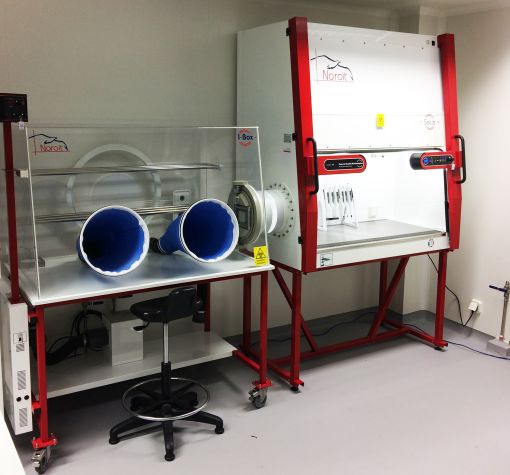Description
Material provided: Physical access for end-users
Unit definition: 1 week of access
Biosafety level: CL2/CL3
Location: Institut de Recherche pour le Développement (IRD), Montpellier, France
Installation name: Vectopole at IRD
Website: www.mivegec.ird.fr
The facility
The Vectopole is a platform located on the IRD campus in Montpellier France dedicated to the study of vectors and the pathogens they transmit. 550 m² of workspace are available, including fully-equipped secure CL2 and CL3 insectaries,labs and animal facility for vector competence, vector behaviour and insecticide resistance surveys. The lab is a WHO Reference center for the use of insecticides in Public Health. The facility includes 85 m² of insectary space in 5 rooms dedicated to insecticide bioassays, 125 m² of CL1 insectary space in 7 rooms for insect rearing and vector behavioural tests, 54 m² of CL2 confined space including 3 rooms for insect rearing and 2 labs and 62 m² of CL3 confined space including 2 rooms for insect rearing and infection, 2 rooms for experiments with small vertebrate hosts and 1 central lab, fully equipped for the production of arboviruses.
The Vectopole is operated by the French joint research unit MIVEGEC, grouping together 100 staff scientists (researchers and research assistants). The unit hosts the national reference centre for Leishmania, the national centre for expertise on vectors (CNEV) and the WHO reference centre for vector resistance to insecticides.
Available vectors
Experiments will be conducted with the following INFRAVEC2-distributed mosquito vector colonies: Aedes aegypti, Aedes albopictus and Culex quinquefasciatus.
Users’ own mosquito colony/strain of interest might be hosted in the lab for the duration of the experiment, upon specific agreement.
Services offered
1 Unit is a 1-week access to a dedicated CL3 lab to undertake pathogen infections (chikungunya, dengue, Zika, West Nile virus) on Aedes colonies.
The unit of access offers the rearing of the mosquitoes necessary for the experiments prior to the arrival of the user and preparation virus stock. Experimental infection with arboviruses (dengue, Zika or chikungunya, West Nile virus) and subsequent analysis will be realised by the user with help from a technician and supervision by a researcher for completion of the assays when necessary. The service can also include infection of mice through mosquito bites and subsequent dissection of relevant tissues (i.e., skin, lymph node, liver…).
Possible experiments
Experiments might include studies of competence, proteomics, transcriptomics, genomics, histology, etc. Mouse experiments can include quantification of infection in mammalian model, dissection of tissues followed by high-throughput analysis on the tissues.
CL3 confined space is equipped with:
- Biological Safety cabinet/Isolation glove boxes: designed to protect the worker, the environment, and the sample from contamination.
- Water-jacked CO2 incubators
- Biosafety Cabinet Thermo MSC Advantage 1.2
- Inverted Fluorescence Microscope Thermo Evos FL
- Ultracentrifuge Sorvall MX-150, w/ 4×7 mL swinging bucket rotor,
- Refrigerated centrifuge Sorvall ST-8R, w/ eppendorf and 15/50 mL centrifuge rotors,
- -80-degree freezer
- -20-degree freezer and refrigerator
- Waterbath 6L Julabo
- Refrigerated table
- The animal room is equipped with modern individually ventilated cages suitable for housing small animals (Techniplast DGM60 CP; GM500). This service promotes and ensures animal care and welfare principles.
For more information, please contact us.

